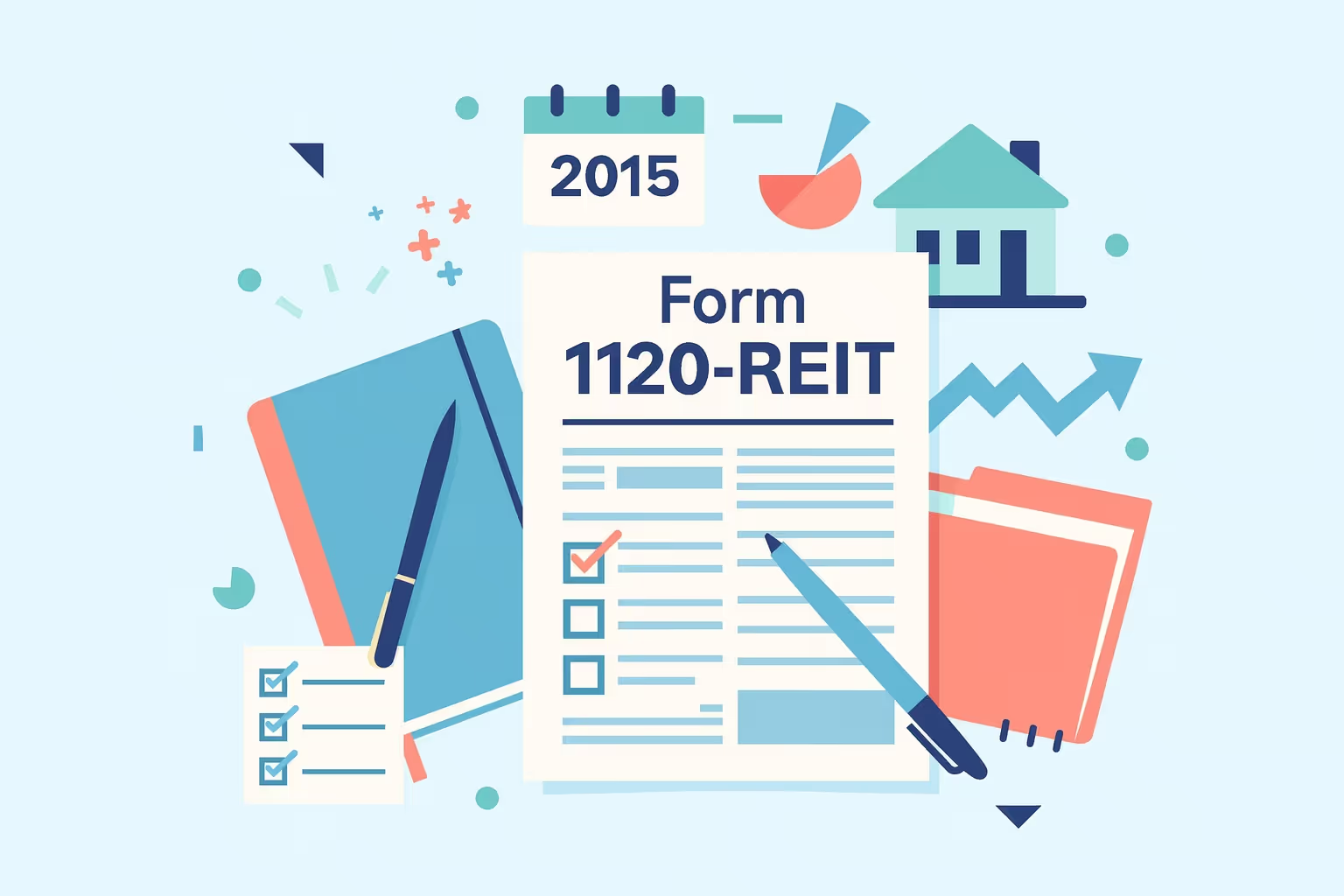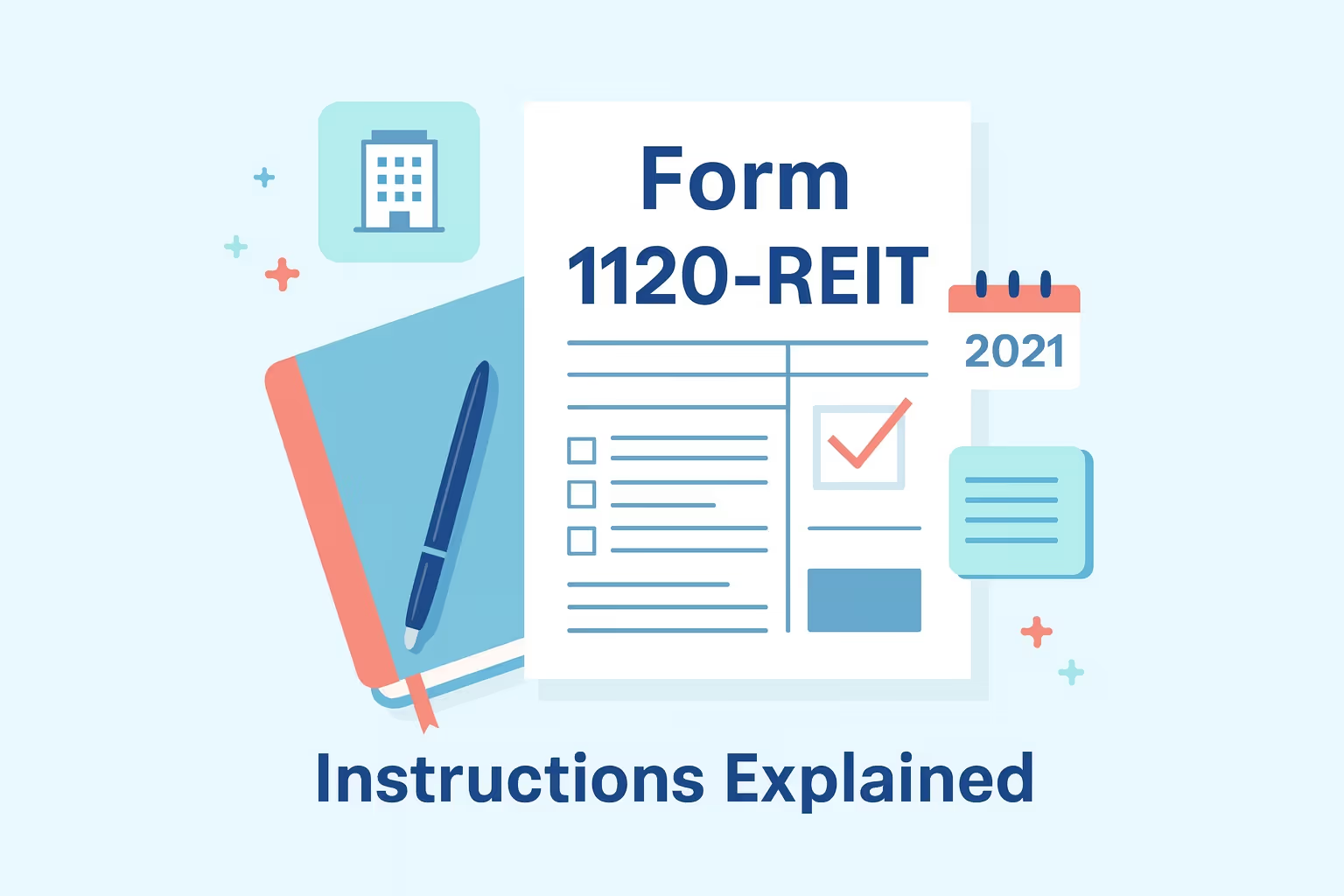
What IRS Form 1120-REIT (2016) Is For
Form 1120-REIT is the income tax return used by a real estate investment trust to report taxable income, net income, gains, losses, dividends paid, and credits. Real estate investment trusts and corporations, trusts, or associations electing REIT status must file this version of the form for the 2016 taxable year if the election had not been terminated.
The filing applies to entities holding real estate assets, including commercial real estate, income-producing real estate, mortgage REITs, or other real estate investment activities that meet the annual income tests under the Internal Revenue Code.
A corporation, trust, or association with one or more trustees must also show that beneficial ownership requirements were met, that five or fewer individuals did not improperly concentrate ownership, and that gross income and real property rules were followed.
For a detailed breakdown of filing requirements, eligibility rules, and step-by-step instructions, see our guide on Form 1120-REIT for 2016.
When You’d Use Form 1120-REIT for 2016 (Late or Amended Filing)
A late filing occurs when a REIT misses the April 15, 2017, deadline and later receives Internal Revenue Service notices about an unfiled income tax return. Amended filings are used to correct taxable income, dividends paid calculations, REIT election issues, or gross income amounts that impact the REIT’s gross income tests.
While refund claims are no longer allowed for this tax year because the statute expired on April 15, 2020, amended filings still matter for maintaining REIT status, avoiding potential classification as a personal holding company, and demonstrating that any filing failure was not due to willful neglect. Compliance helps prevent issues with taxable REIT subsidiaries, qualified REIT subsidiary reporting, or unrelated business taxable income.
Key Rules Specific to 2016
- New due date: The return was originally due on April 15, 2017, for most REITs, and this date also applied to domestic corporation filers with real estate assets and properties.
- Minimum penalty: The late filing penalty increased to $205 for returns more than 60 days late, and interest is applied on any tax imposed.
- Special provisions: Certain rules applied to qualified timber gains and foreclosure property starting in 2016, including fair market value considerations for real property.
- Distribution requirements: REITs had to satisfy the 90 percent dividend requirement based on taxable income calculations before changes enacted after 2017.
- Ongoing qualification standards: REITs needed to meet income tests, asset tests, and avoid impermissible tenant service income or personal property leased arrangements that exceeded allowable thresholds.
Browse more tax form instructions and filing guides in our Forms Hub.
Step-by-Step (High Level)
- Request IRS transcripts: You should gather tax account transcripts from the Internal Revenue Service to verify payments, notices, and such income items that match filing records.
- Prepare the correct form: You must complete the 2016 version of Form 1120-REIT, not a later year’s income tax return, especially for equity REITs, publicly traded REITs, or mortgage REITs.
- Attach the required schedules: You must attach Schedule A, Schedule J, Schedule K, Schedule L, capital gain schedules, and any other schedules related to portfolio income, government securities, or obligations secured by real estate.
- File with the proper center: You should file with the correct IRS service center or through an approved provider, if supported, especially when reporting taxable REIT subsidiaries or real estate investment activity.
- Retain complete records: You must keep copies of all filings, fair market value documentation, real estate investment receipts, and evidence of exercising reasonable diligence during the preparation process.
Learn more about federal tax filing through our IRS Form Help Center.
Common Mistakes and How to Avoid Them
- Filing Form 1120 instead of Form 1120-REIT: This can jeopardize a REIT election, so you should confirm that the distributing corporation or entity qualifies as a real estate investment trust before filing.
- Miscomputing the 90 percent requirement: Miscalculating dividends paid against taxable income leads to errors, so you should verify net income amounts and ensure that such distribution rules are followed.
- Failing income and asset tests: Violations of income tests or asset diversification rules occur when personal property or financial institution income is misclassified, so you should review REIT investments carefully.
- Missing ownership proof: Lacking beneficial ownership documentation for individual investors can cause delays, so it is recommended to retain transferable certificates or records supporting publicly traded REITs.
- Incorrect schedule order: Missing or misordered attachments slow processing, so you should follow the IRS sequence for total assets, gross assets, and REIT’s total assets reporting.
- Not documenting tenant service rules: Impermissible tenant service income issues arise when services customarily furnished are misclassified, so you should confirm whether an eligible independent contractor is required.
Learn more about how to avoid business tax problems in our guide on How to File and Avoid Penalties.
What Happens After You File
The IRS may take months to process late-filed returns due to manual review. You may receive confirmation of receipt, followed by acceptance or requests for clarification. Interest income, penalties, and amounts owed continue to accrue until you pay tax due for the taxable year.
If the REIT cannot pay in full, payment plans may be requested using Form 9465 or IRS online tools. Filing helps restore compliance and ensures that such failure to meet earlier deadlines does not affect future tax advantages, long-term capital appreciation planning, or financing real estate activities.
FAQs
What penalties apply to late filings for IRS Form 1120-REIT (2016) and real estate investment trusts?
Penalties typically include monthly charges for unpaid taxes, as well as failures related to income tests and dividend payment requirements. A real estate investment trust filing late may also incur interest until the income tax return is fully paid. These rules apply to equity REITs, publicly traded REITs, and any estate investment trust REIT that fails to meet the deadlines.
Can a real estate investment trust still get transcripts for its 2016 income tax return?
Yes, real estate owners, mortgage REITs, and publicly traded REITs can still request transcripts that show net income, dividends paid, and other return data. These records help verify that income tests were met and that the return aligns with Internal Revenue Service records for the tax year.
Is there a statute of limitations for amended filings involving real estate and real estate investment activity?
The refund window for this tax year has expired, but amending still helps correct errors affecting equity REITs, REIT investments, dividends paid, or foreclosure property issues. Filing updates ensures compliance with income tests and confirms that the entity continues to qualify as a real estate investment trust.
Should amendments also be filed with states for publicly traded REITs or similar entities?
Many states require amended filings when the federal income tax return changes. This includes real estate investment, equity REITs, mutual funds that hold REIT shares, and other entities that report net income or dividends paid. Filing helps maintain conformity and prevents classification problems related to personal holding company rules.
What if a REIT filed the wrong form and failed the income tests for the 2016 taxable year?
Filing an incorrect form or failing income tests may affect a REIT’s ability to qualify as a real estate investment trust. Amending helps correct net income reporting, foreclosure property issues, dividend payments, and other items that affect REIT status. Addressing these errors helps ensure compliance for future filings.


































